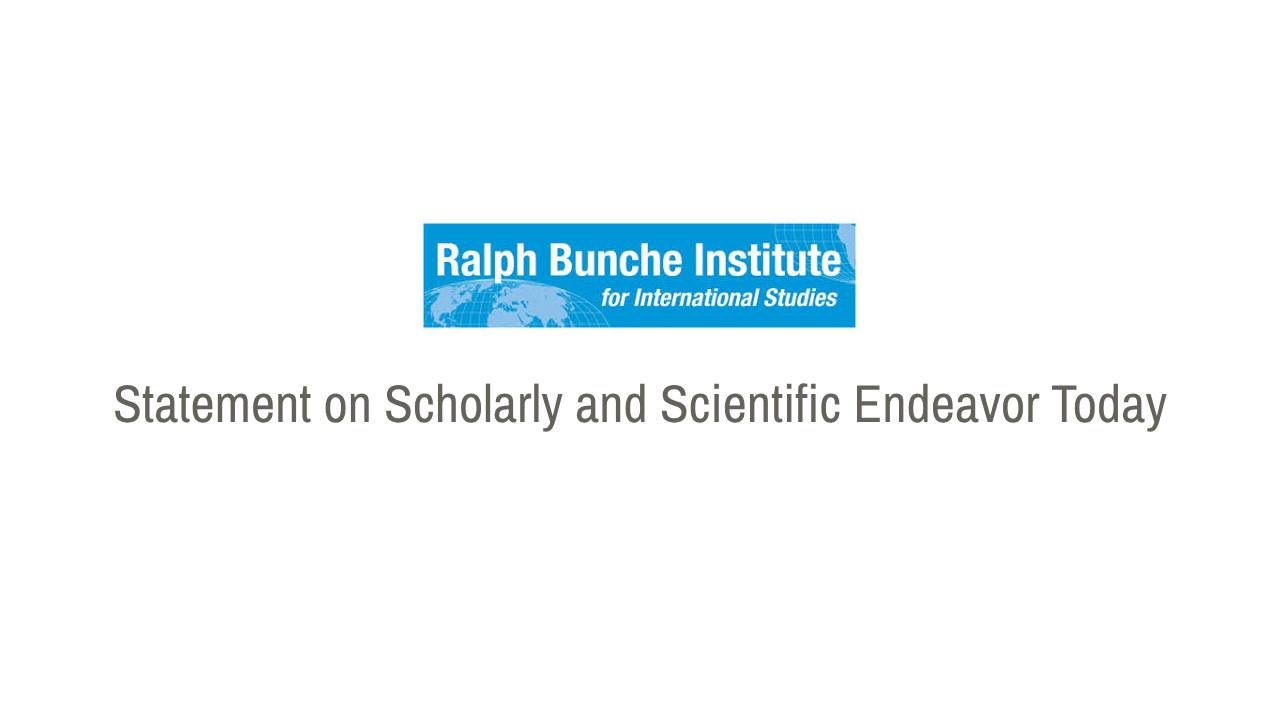Statement on Scholarly and Scientific Endeavor Today
The Ralph Bunche Institute for International Studies at the Graduate Center of the City University of New York is devoted to research, teaching, and scholarship on international affairs and to informing public discussion of international issues. As an academic institution, we support knowledge creation for the benefit of all Americans.
We are therefore chagrined by the Administration’s attacks on universities and other scientific and cultural institutions that enlighten and inform the American people. Almost since its inception, the new Administration has demanded that educational and research institutions in this country do as it wishes in regard to research and curriculum matters. It has cut or threatened to withdraw federal support from institutions that fail to do as the Administration insists. It has suggested that it will strip Harvard University of its non-profit status, costing it many millions of dollars in operational funds. The Administration has also proposed large reductions in the budgets of our leading scientific and medical research institutions, such as the National Institutes of Health and the National Science Foundation. The process of selecting recipients of prestigious Fulbright fellowships, an important element of this country’s outreach to and understanding of other countries around the world, has been compromised and partnerships have been undermined.
What purpose does all this disruption serve? The Administration is proposing these cuts in an effort to bring these invaluable institutions under its control. PhD scientist and Illinois Congressman Bill Foster, lamenting the huge cuts being proposed to our country’s science budget, has said that “patients will die for lack of life saving cures, and this will cripple the US scientific enterprise for generations to come.” The effort to control our scientific and scholarly institutions will only undermine their effectiveness. This is because autonomy – better known in the case of our universities as academic freedom — is crucial to the success of scholarly endeavor.
The Administration’s demands have often been illegal or contrary to procedures laid out in the documents governing our country’s independent scientific, scholarly, and cultural institutions. Whether or not the government’s demands are found by courts to be legitimate, the damage is often done. By the time courts decide cases, the work in question is destroyed. Experiments are interrupted or cancelled, spoiling research that might have led to life-changing scientific and medical breakthroughs. If the required procedures were followed, surely some sort of compromise could be found that would serve everyone’s interests.
We support the Administration’s endorsement of meritocracy as the basis of all hiring and promotion decisions. We believe that this system of rewards has been crucial in making the United States the leader in scholarly and scientific research and training in the past several decades. But in scholarly matters, this means allowing other scholars – experts knowledgeable in their fields, such as the members of the National Academy of Science, Engineering, and Medicine or the scholars who have been selected by their peers to be on the faculty of the country’s leading universities – to lead the way.
Again, academic freedom is at the heart of the success of our scholarly and scientific enterprises; surrender of that freedom will undermine the quality and the good name of the research conducted at universities and independent scientific enterprises across the land. Why would we abandon a network of research and scholarship that has been the envy of the world and the foundation of our progress as a nation for the last seventy-five years?
It needs to be said: The attack on scholarly and academic institutions is helping turn the United States into a pariah country. Whereas in recent decades our scientists and scholars have been among the leading candidates for partnerships with international collaborators, scholars elsewhere increasingly ask themselves why they would partner with American colleagues when the risks are so great. Other countries are even telling our researchers that they can move there and escape the unsatisfactory conditions in which they find themselves here. Some have already left. Our leading position in the scholarly world is being gravely damaged. Often it is students, the next generation of our scholarly enterprise, who suffer the consequences of these decisions. These relationships and reputations are very hard to build up yet very easy to destroy.
For all these reasons, we urge the Administration to reconsider its approach to reforming university life and practices. It should do so in the interest of the well-being of all Americans, especially the most vulnerable. Our academic and scientific institutions are the jewel in the American crown of innovation; why not rebuild them rather than tear them down?
John Torpey
Presidential Professor and Director
Ralph Bunche Institute for International Studies
Eli Karetny
Associate Director
Ralph Bunche Institute for International Studies

